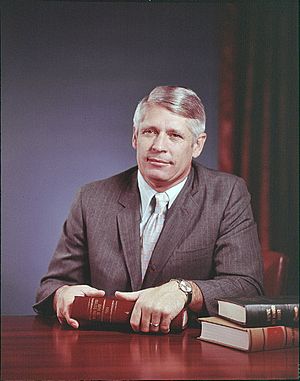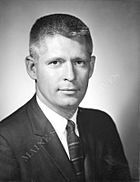Kenneth M. Curtis facts for kids
Quick facts for kids
Kenneth M. Curtis
|
|
|---|---|
 |
|
| United States Ambassador to Canada | |
| In office October 5, 1979 – January 20, 1981 |
|
| President | Jimmy Carter |
| Preceded by | Thomas O. Enders |
| Succeeded by | Paul H. Robinson Jr. |
| Chair of the Democratic National Committee | |
| In office January 21, 1977 – January 27, 1978 |
|
| Preceded by | Robert S. Strauss |
| Succeeded by | John C. White |
| 68th Governor of Maine | |
| In office January 5, 1967 – January 2, 1975 |
|
| Preceded by | John H. Reed |
| Succeeded by | James B. Longley |
| Secretary of State of Maine | |
| In office 1965–1966 |
|
| Governor | John H. Reed |
| Preceded by | Paul A. MacDonald |
| Succeeded by | Joseph T. Edgar |
| Personal details | |
| Born |
Kenneth Merwin Curtis
February 8, 1931 Leeds, Maine, U.S. |
| Political party | Democratic |
| Spouse | Pauline "Polly" Curtis |
| Children | Susan L. Curtis Angela Curtis Hall |
| Education | Cony High School Maine Maritime Academy (BS) University of Maine School of Law (LLB) Bates College (LLD) |
Kenneth Merwin Curtis (born February 8, 1931) is an American lawyer, politician, and diplomat from Maine. A diplomat is a person who represents their country's government in another nation.
Curtis has held many important jobs. He was the Secretary of State of Maine from 1965 to 1966 and the 68th Governor of Maine from 1967 to 1975. He also served as the United States Ambassador to Canada from 1979 to 1981. He is a member of the Democratic Party. Today, he works as a special advisor, or Of Counsel, at a law firm he started in Portland, Maine.
Contents
Early Life and Schooling
Kenneth Curtis was born in a part of Leeds, Maine, called Curtis Corner. His father, Archie, was a farmer whose family had lived on the same land for five generations.
Curtis went to Cony High School in Augusta, graduating in 1949. He then attended the Maine Maritime Academy, where he earned a science degree in 1952.
After college, Curtis served in the U.S. Naval Reserve from 1953 to 1955 during the Korean War. When he left the Navy, he decided to study law. He earned his law degree from the Portland University School of Law in 1959.
A Career in Politics
Curtis's political career started in 1956. He helped with James Oliver's campaign for a seat in the U.S. Congress. Although Oliver lost that year, he won two years later with Curtis as his campaign manager. Curtis then worked as Oliver's assistant from 1959 to 1961.
In 1963, President John F. Kennedy appointed Curtis to a position helping to develop local economies in Maine. A few years later, from 1965 to 1966, Curtis served as the Secretary of State of Maine. This role involves overseeing elections and state records.
Governor of Maine (1967-1975)
In 1966, Curtis ran for governor of Maine and won. At the time, he was the youngest governor in the entire United States. He was reelected in 1970 in a very close race, winning by just 890 votes. He was the first governor of Maine to serve two full four-year terms.
What He Did as Governor
As governor, Curtis made several big changes in Maine.
- Education: In 1968, he combined the University of Maine with five other state colleges. This created the University of Maine System that exists today.
- Taxes: In 1969, his government created Maine's first income tax. This tax on people's earnings became a major source of money for the state to pay for services like schools and roads.
- Environment: He helped pass laws to protect Maine's natural beauty. His government created the Department of Environmental Protection.
- Government Reform: In 1972, he reorganized the state government. He replaced 150 separate agencies with 16 larger departments. This made the government work more like a cabinet, where department heads are chosen by the current governor.
Curtis was also known for his love of the outdoors. He was one of the few governors to climb Mount Katahdin and canoe the Allagash River while in office.
Life After Being Governor
After his time as governor ended in 1975, Curtis started a law firm called Curtis Thaxter. From 1977 to 1978, he was the chairman of the Democratic National Committee, the main organization for the Democratic Party in the U.S.
Ambassador to Canada
From 1979 to 1981, Curtis served as the U.S. Ambassador to Canada. This was during the Iran hostage crisis, a time when American diplomats were held captive in Iran. Curtis played a key role in communicating about six Americans who were secretly sheltered by Canadian officials in Iran. This secret rescue mission was later called the "Canadian Caper."
President of Maine Maritime Academy
From 1986 to 1994, Curtis returned to his old school, the Maine Maritime Academy, to serve as its president.
Family and Legacy
Curtis married Pauline "Polly" Brown in 1956. They had two daughters, Susan and Angela. Both daughters were born with cystic fibrosis, a genetic disease that affects the lungs.
Sadly, Susan passed away in 1970 at age 11. Because her father was governor, many people sent money to the family to show their support. The Curtis family used these donations to start a nonprofit group called the Susan L. Curtis Foundation. In 1974, the foundation opened Camp Susan Curtis, a summer camp for Maine children from low-income families.
Their second daughter, Angela, passed away from the same disease in 1996 at the age of 34.
After living in Florida for a while, Kenneth and Polly Curtis returned to Maine. He continues to be an advisor at the law firm he founded.
Honors and Appointments
Throughout his career, Curtis has received many honors and has been asked to serve on the boards of many companies and organizations.
| Boards | Honorary Degrees |
|---|---|
| Board of Directors, KeyCorp Board of Directors, Bowater Incorporated Board of Directors, New England Telephone Co. Alberta Northeast Gas Ltd. Advisory Board Board of Trustees, Susan L. Curtis Foundation Council of Former American Ambassadors Board of Visitors, University of Maine School of Law |
University of Maine University of New Brunswick Bowdoin College Colby College Bates College University of New Hampshire Mount Allison University Saint Joseph's College of Maine St. Francis College Unity College |
 | Stephanie Wilson |
 | Charles Bolden |
 | Ronald McNair |
 | Frederick D. Gregory |


